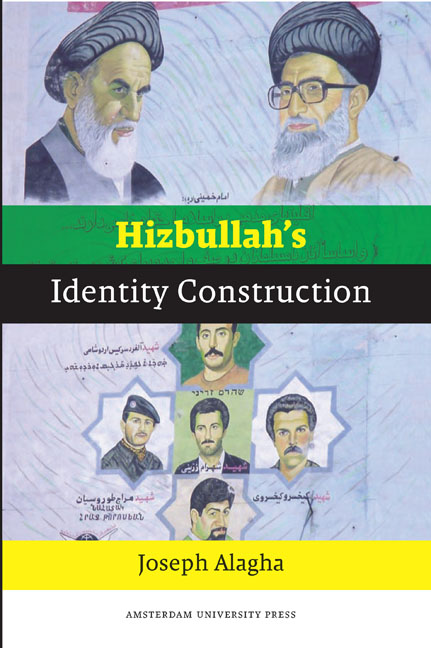Book contents
- Frontmatter
- Dedication
- Contents
- A Note on Transliteration
- Acknowledgements
- List of Abbreviations
- Summary
- Introduction and Analytical Framework
- 1 Tolerance and Discrimination: Ahl Al-Dhimma in the Islamic Order
- 2 Interpretation and Authority: Wilayat Al-Faqih
- 3 Political Violence: Terrorism and 9/11
- 4 Political Violence: Suicide Operations
- 5 From Cooptation to Contestation to Political Power
- 6 The Doha 2008 Accord and its Aftermath
- 7 The Eighth Conclave: A New Manifesto (November 2009)
- 8 Epilogue: Future Prospects – Disarmament and the Peace Process
- Afterword
- Glossary
- Additional Reading
- Notes
- Selected Bibliography
- Index
- Praise for Hizbullah's Identity Construction (1978-2010)
8 - Epilogue: Future Prospects – Disarmament and the Peace Process
Published online by Cambridge University Press: 19 January 2021
- Frontmatter
- Dedication
- Contents
- A Note on Transliteration
- Acknowledgements
- List of Abbreviations
- Summary
- Introduction and Analytical Framework
- 1 Tolerance and Discrimination: Ahl Al-Dhimma in the Islamic Order
- 2 Interpretation and Authority: Wilayat Al-Faqih
- 3 Political Violence: Terrorism and 9/11
- 4 Political Violence: Suicide Operations
- 5 From Cooptation to Contestation to Political Power
- 6 The Doha 2008 Accord and its Aftermath
- 7 The Eighth Conclave: A New Manifesto (November 2009)
- 8 Epilogue: Future Prospects – Disarmament and the Peace Process
- Afterword
- Glossary
- Additional Reading
- Notes
- Selected Bibliography
- Index
- Praise for Hizbullah's Identity Construction (1978-2010)
Summary
Islam's ability to dominate a state's identity is highly contested. While powerful Islamic movements exist within several states in the region [Middle East], these groups are encountering alternative definitions of community, based on divisions within Islam (Shia versus Sunni), race and language (Arab versus non-Arab), or clan and tribe… While some of these movements and some states are trying to increase Islamic influence and identity in other countries, the success of these efforts is not assured.
INTRODUCTION
Hizbullah's specific religious ideology has been based upon mobilization, Jihad, and martyrdom, as determined by al-waliyy al-faqih, first Imam Khumayni and after his death Imam Khamina’i. Based on the aforementioned and keeping in mind that religious ideology ultimately wields religious capital, one can argue that Hizbullah's religious ideology is both 1): an exclusionary ideological identity based on belief in wilayat al-faqih, which is a “novel and almost unprecedented reinterpretation of religious canon”; and 2): a return to the fundamentals of Shi‘ite faith as a primary historical identity. “To most Islamists, Islam is the first and key identity [primary historical identity] but not the sole identity… In other words to grant a certain priority to the Muslim identity is to make a statement about the character of the challenge [problems] that individuals and societies face and about the nature of the solution”, the solution that is provided by Hizbullah's adoption and application of Wilayat al-Faqih. In fact, belief and application of Wilayat al-Faqih is what distinguishes Hizbullah from other Shi‘ite political parties and Islamist movements, in general, thus endowing Hizbullah with a distinct religious identity stemming from its adherence to this specific Islamic cultural sphere that in the first place produced this collective unifying identity. On these grounds, wilayat al-faqih seems to be an elitist exclusionary doctrine that unifies the adherents of this distinct Shi‘ite religious identity that upholds martyrdom and victory as the expected fruits or rewards of jihad. Thus, building on its religious ideology, Hizbullah was able to accumulate religious capital based on the production of religious knowledge (Wilayat al-Faqih) through construction, appropriation, dissemination, and adherence to the Islamic cultural sphere which comprises the party's constituencies and followers.
- Type
- Chapter
- Information
- Hizbullah's Identity Construction , pp. 177 - 186Publisher: Amsterdam University PressPrint publication year: 2012

